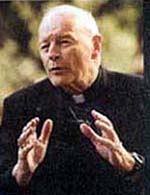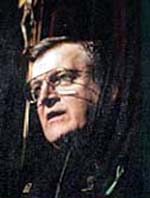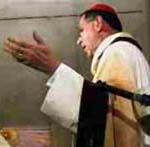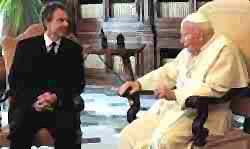 |
Consequences of Vatican II
The Confused ‘Clear Teaching’ of the Bishops
Marian T. Horvat, Ph.D.
“I welcome and support the Statement made by the Bishops of the United States, ‘Catholic in Political Life,’ in which we reiterate consistent Catholic teachings on the value of human life .…” stated Cardinal Roger Mahony in a feature article in his diocesan paper, The Tidings (June 25). He couldn’t be more pleased with the USCCB statement released June 18 that essentially backed up those Bishops who permit Catholic abortionist politicians to receive Communion.
As in the Protestant sects, now Catholics can choose which teaching to follow:

For Card. McCarrick, head of the Task Force, each Bishop is free to teach what he wants.

For Archbishop Burke, pro-abortion politicians should not receive Communion.

For Card. Mahony, pro-abortionists should receive Communion. |
The point Mahony is celebrating is expressed in a single crucial sentence in the document approved in a 183-6 vote during a closed session of the Bishops recent meeting in Denver. Here is the line responding to the question whether it is necessary to deny Holy Communion to Catholics in public life who support abortion on demand:
“Given the wide range of circumstances involved in arriving at a prudential judgment on a matter of this seriousness, we recognize that such decisions rest with the individual Bishop in accord with established canonical and pastoral principles” (USCCB website).
With this, the Conference of U.S. Bishops carefully sidestepped the issue of whether its members should or should not deny Communion to openly abortionist politicians. They neither supported the handful of Bishops who have faithfully tried to comply with Catholic teaching on this important matter, nor did they demand compliance to that teaching from the rest. No one is right. No one is wrong. Let each Bishop decide for himself what is Church teaching on the topic. It is a completely relativist response, hardly the “clear teaching” the document insists is “the obligation of the Bishops at this time.”
Church teaching is really very clear and simple: A Catholic cannot receive Holy Communion if he not in the state of sanctifying grace. To publicly support abortion is not only a personal sin that removes the person from the state of grace, but also a grave sin of scandal, a behavior that offers occasion for others to make the same sin. The Bishop, safeguard of the Faith, is called to protect the flock from both kinds of sins, personal mortal sin and the grave sin of scandal. Further, he should safeguard the glory of God, truly present in the Eucharist, by only allow worthy reception of the Sacred Species.
This means if the Bishop knows a Catholic is leading a life of sin or publicly taking serious stances opposed to Catholic teaching, then he has the obligation to refuse Communion to such persons. Canon Law n. 915 clearly teaches that the ecclesiastics administering the Sacrament bear the responsibility of not admitting to Communion those who persist in manifest, obstinate sin. Could the teaching be clearer? Could it be simpler?
Notwithstanding, in “Catholics in Political Life,” the Bishops did not reiterate this teaching of the Church. Instead, they determined each Bishop might choose for himself the path he will follow.
Therefore, if you attend Mass in the St. Louis Diocese (or perhaps some six others in the country), you will hear the teaching that no public official claiming to be Catholic can actively support abortion. You will be instructed that no Catholic should support a pro-abortion candidate.
If, however, you reside in Los Angeles (or perhaps some 186 other Dioceses in the country), you will receive a different “clear teaching”: the good and the bad can receive Communion, no problem, no sanctions. The Catholic vote should be guided by a generic “consistent life ethic,” which considers abortion as just one among many social issues.
Does this kind of inconsistency reflect a clear and solid teaching of the Bishops? It sounds to me more like a confused and ambiguous instruction and a betrayal of their moral teaching mission.
The 'interim reflections': Rationale for the stand
If not clear and consistent, the statement of the Bishops was at least short and curt. Another document, much longer and more tangled, was released June 15 by Cardinal McCarrick on behalf of a Task Force on Catholic Bishops and Catholic Politicians. The extensive interim report revealed the rationale and arguments for the position adopted by the Bishops in their Statement that was released three days later. Entitled “Interim Reflection of the Task Force on Catholic Bishops and Catholic Politicians,” this document has received much less public attention and scrutiny.
What did this Task Force, made up of the elected chairs of seven major USCCB committees, advise on the question of Bishops denying Communion to abortionists? They should not employ sanctions. Quite emphatically stated. Why? Because it is “contrary to our teaching,” is often counter-productive with negative effects, and is in potential conflict with civil law. In short, the Task Force affirmed, it is not a truly pastoral response or solution.
Ratzinger to the rescue
After making this conclusion, Cardinal McCarrick called a surprise hitter to the bat to secure his position. “As you know,” he reported, “I have once again been in contact with Cardinal Ratzinger both by letter and telephone calls.” Ratzinger asked specifically that his words should not be published, but McCarrick offered strong hints about the way the wind is blowing at the Vatican. Regarding the use of sanctions, Ratzinger advised caution and pastoral prudence. Instead of sanctions, he suggested a lengthy process of meetings, instruction and warning. His message is clear enough: Stop the sanctions.
On what Bishops should teach about the Catholic vote, Ratzinger made this astounding affirmation: A Catholic would be guilty of “formal cooperation” in the evil of abortion only if he were to deliberately vote for a candidate precisely because the candidate favored abortion. If a Catholic votes for a pro-abortion candidate for other reasons, it is considered “remote material cooperation,” which is permissible if there are proportionate reasons.
So we have another quite clear message from Ratzinger: Catholics can vote for pro-abortion candidates so long as they have other reasons for doing so. Truly, it could not be a more timely “teaching” to favor the election of the pro-abortionist John Kerry, the likely candidate of the Democratic party. Ratzinger, in effect, supports the “teaching position” of Cardinals McCarrick and Mahony, but not Bishop Burke.

JPII gave Tony Blair Communion at the Vatican |
Is Ratzinger the only Vatican official who supports this opinion of the American Bishops? Perhaps it is useful to recall that John Paul II would also appear to back this stance, if one is to judge from his past behavior. On February 23, 2004, John Paul II gave Holy Communion to Episcopalian Prime Minister Tony Blair of England, a pro-abortion politician, along with his Catholic and avidly pro-abortion wife Cherie, at a Mass in his private apartments.
As I noted above, to refuse the Sacred Species to a public figure who is openly pro-abortionist is the only position consistent with Catholic Morals. I don’t know how you can qualify these positions of JPII and Ratzinger as ”conservative” or even orthodox, but I’m sure there will be some persistent blind conservative Catholics who will attempt to do so…

Posted June 28, 2004
|
Vatican II | Hot Topics | Home | Books | CDs | Search | Contact Us | Donate

© 2002- Tradition in Action, Inc. All Rights Reserved
|
 |
|